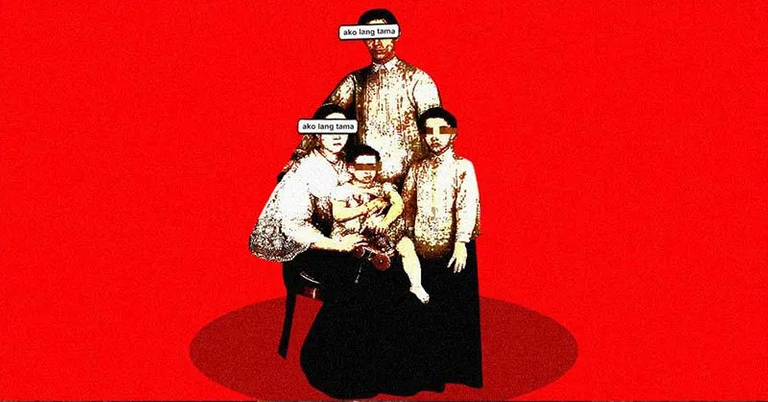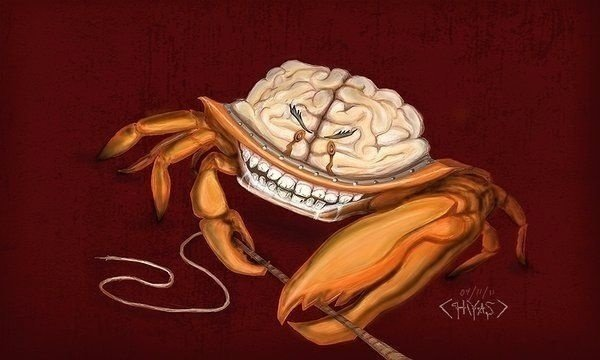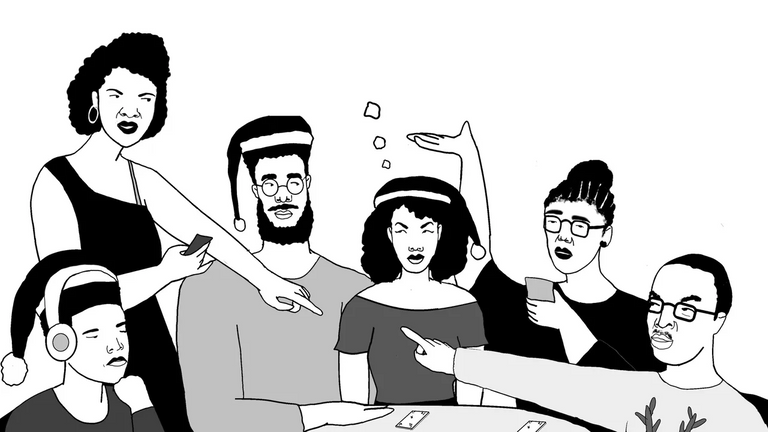On Filipino Toxic Culture: Responsibility or Gratitude?

Photo Credit: Wonder PH
Family is always going to be family. Parents are the foundation that keeps and binds the family together, and they play an important role in the family structure. Whether it's a little or large family, parents are the ones that provide love, support, and comfort to their children, either financially or emotionally; it's part of their responsibility as parents. We all know that we live in a country where any topic may be flipped and manipulated by anyone. There are so many angles and points of view to examine that we sometimes don't know what to consider. There has recently been a lot of talk about “Toxic Filipino Culture” on the internet.
People are attempting to point out cultures that we do not comprehend and do not find relevant, but choose to obey regardless. However, there are some points of view that are so correct that it captures everyone's attention and causes them to think sensibly; it is so correct that people begin to realize something and Crab Mentality. This is one of them. We are not obligated to repay our parents once we graduate.
One of the primary causes of failure and depression is what is known as Anticipatory Stress. Anticipatory stress, we felt, emerges in both definite and vague expressions in association with future concerns. Some people experience anticipatory stress as a general sense of dread about what is to come. This type of stress is frequently generated by a lack of confidence or an overall dread of failing in some way. Many students may feel this way throughout their final year of college, as they begin to hunt for jobs or plan their next steps following graduation.
Throughout this developmental period where young people form great desires for love, attention, and spaces of belonging, the family unit plays a critical role in cultivating such an environment. In contrast, when adolescents are at the center of family conflicts or are subjected to unreasonable performance criteria, those highly valued features of healthy youth development suffer. While we are still in school, we frequently hear our parents or relatives say things like, "you must study hard so that you might have a decent career someday." "Don't choose a job that doesn't pay well," or "You must graduate so you can help raise your siblings." Which isn't always a bad thing in my opinion. It can be motivating for some, but most of us feel pushed when people say those things to us, especially when they come from our parents or others who support us with our needs.
When it comes to cognitive development, people try to replicate their surroundings as a way of growth and survival. In this scenario, the milieu in which our elders lived accepted poison as a natural element of Filipino culture. This lengthy exposure explains why these behaviors are strongly ingrained in cultural social behaviors and family systems, and why they cannot be expected to alter overnight. This kind of society is extremely harmful. After graduation, society will put pressure on you to have everything worked out and have a solid career, leaving you with little time for yourself. Filipinos have a sense of entitlement, believing that their children, siblings, relatives, friends, acquaintances, foreigners, government, and others owe them something.

Photo Credit: Change.org
When looking at the process of cognitive development, people tend to mimic their environment as a means of growth and survival. In this case, the environment that surrounded our elders treated toxicity as a normal part of Filipino culture. This prolonged exposure explains why these habits are deeply embedded into cultural social practices and family structures, and cannot be expected to change right away.
This kind of culture is so toxic. Society will pressure you to have everything figured out after graduation and get a good job, barely having time for yourself. Filipinos have a sense of entitlement, believing that their children, siblings, relatives, friends, acquaintances, outsiders, government, neighbors, and the entire world owe them something. Parents regard their children as an investment and retirement plan; Families regard successful family members as ATM machines; Hypocrites, particularly the Crab Mentality.
On the other hand, the Philippines still remains to be poor even though we, Filipinos, have been longing for its progression. You can’t even mess things up because you’ll have people depending on you. Some parents think that it is the responsibility of their children to pay them back after their studies for all the things they have done for them. If you decline and go the other way you’ll be the black sheep of the family and worst, the whole family tree and even the relatives.
Finally, we are sacrificing their health and pleasure in order to ensure that their families are in the most comfortable circumstances possible. But, just to be clear, it is not the responsibility of children to repay their parents after graduation since, if we are talking about the resources and money that parents spend on their children? It is not a favor, it is their role as a parent to take care of their children in the first place, and it is not something that their children owe to their parents, but rather it is their role as a parent, with this type of poisonous Filipino culture, mentality also had a significant impact on their children's lives, particularly dealing with pressure.
Why is this Important? During this developmental stage, when young individuals acquire strong demands for affection, attention, and spaces of belonging, the family unit plays a vital role in generating such an atmosphere. It's like an epidemic, a virus that must be handled from the ground up before it spreads to every Filipino. Given this, let us recognize that there is a need for reform. We've all been focusing on the positive aspects of our Filipino culture; yet, the unpleasant aspects will not fade away simply because we try to ignore them.
Time couldn't cure this wound; in fact, it aggravated it. It's like if you try to rectify someone's toxicity, but if the person refuses to participate, the words you hear will only enter one ear and escape the other. The source of this toxic culture is inside us, and some are gradually coming to comprehend this. We need to expand our minds not just by a few individuals, but by an increasing number of people in our society. Years would pass, and others may have lived and complained about the same condition, but no action was taken in the face of this kind of Filipino toxic culture.

Photo Credit: New Yorker
Ang pamilya ay palaging magiging pamilya. Ang mga magulang ay ang pundasyon na nagpapanatili at nagbubuklod sa pamilya, at naglalaro sila ng mahalagang papel sa istraktura ng pamilya. Kung ito ay isang maliit o malaking pamilya, ang mga magulang ay ang mga nagbibigay ng pag-ibig, suporta, at ginhawa sa kanilang mga anak, alinman sa pananalapi o emosyonal; Ito ay bahagi ng kanilang responsibilidad bilang mga magulang. Alam nating lahat na nakatira tayo sa isang bansa kung saan ang anumang paksa ay maaaring binaligtad at manipulahin ng sinuman. Maraming mga anggulo at mga punto ng pananaw upang suriin na kung minsan ay hindi namin alam kung ano ang dapat isaalang-alang. Nagkaroon kamakailan ng maraming pag-uusap tungkol sa "nakakalason na kulturang Filipino" sa Internet.
Sinusubukan ng mga tao na ituro ang mga kultura na hindi namin naiintindihan at hindi nakahanap ng may-katuturan, ngunit piliin na sumunod nang walang kinalaman. Gayunpaman, may ilang mga punto ng pagtingin na tama na kinukuha nito ang pansin ng lahat at nagiging sanhi ng pag-isipan nila nang may katalinuhan; Totoong tama na ang mga tao ay nagsimulang mapagtanto ang isang bagay at pag-iisip ng alimango. Ito ay isa sa mga ito. Hindi kami obligado na bayaran ang aming mga magulang sa sandaling magtapos kami.
Ang isa sa mga pangunahing sanhi ng kabiguan at depresyon ay kung ano ang kilala bilang anticipatory stress. Ang stress ng anticipatory, nadama namin, lumilitaw sa parehong tiyak at malabo na mga expression na kasama ng mga alalahanin sa hinaharap. Ang ilang mga tao ay nakakaranas ng anticipatory stress bilang isang pangkalahatang pakiramdam ng pangamba tungkol sa kung ano ang darating. Ang ganitong uri ng stress ay madalas na nabuo sa pamamagitan ng kakulangan ng kumpiyansa o isang pangkalahatang pangamba sa pagkabigo sa ilang paraan. Maraming mga estudyante ang maaaring makaramdam sa ganitong paraan sa kanilang huling taon ng kolehiyo, habang nagsisimula silang manghuli para sa mga trabaho o planuhin ang kanilang susunod na mga hakbang na sumusunod sa graduation.
Sa buong panahon ng pag-unlad na ito kung saan ang mga kabataan ay bumubuo ng mahusay na mga pagnanasa para sa pag-ibig, pansin, at mga puwang ng pag-aari, ang yunit ng pamilya ay gumaganap ng isang kritikal na papel sa paglinang tulad ng isang kapaligiran. Sa kaibahan, kapag ang mga kabataan ay nasa sentro ng mga salungat sa pamilya o napapailalim sa hindi makatwiran na pamantayan sa pagganap, ang mga mataas na halaga ng mga tampok ng malusog na kabataan ay nagdurusa. Habang kami ay nasa paaralan pa, madalas naming maririnig ang aming mga magulang o mga kamag-anak ay nagsasabi ng mga bagay na tulad ng, "Dapat kang mag-aral nang husto upang magkaroon ka ng isang disenteng karera sa ibang araw." "Huwag pumili ng trabaho na hindi mahusay na magbayad," o "dapat kang magtapos upang matulungan kang itaas ang iyong mga kapatid." Na hindi palaging isang masamang bagay sa aking opinyon. Maaari itong maging motivating para sa ilan, ngunit karamihan sa atin ay nadarama kapag sinasabi ng mga tao ang mga bagay na iyon sa atin, lalo na kapag nagmula sila sa ating mga magulang o sa iba na sumusuporta sa atin sa ating mga pangangailangan.
Pagdating sa pag-unlad ng pag-iisip, sinisikap ng mga tao na magtiklop ang kanilang kapaligiran bilang isang paraan ng paglago at kaligtasan. Sa sitwasyong ito, ang milieu kung saan nakatira ang aming mga matatanda ay tinanggap ang lason bilang isang likas na elemento ng kulturang Pilipino. Ipinaliliwanag ng napakahabang pagkakalantad kung bakit ang mga pag-uugali na ito ay malakas na nakatanim sa kultural na pag-uugali ng lipunan at mga sistema ng pamilya, at kung bakit hindi sila maaaring inaasahan na baguhin ang magdamag. Ang ganitong uri ng lipunan ay lubhang mapanganib. Pagkatapos ng graduation, ang lipunan ay magpapalakas sa iyo na magkaroon ng lahat ng bagay na nagtrabaho at magkaroon ng matatag na karera, na iniiwan ka nang kaunting oras para sa iyong sarili. Ang mga Pilipino ay may pakiramdam ng karapatan, naniniwala na ang kanilang mga anak, mga kapatid, kamag-anak, kaibigan, kakilala, dayuhan, gobyerno, at iba pa ay may utang sa kanila.
Kapag tinitingnan ang proseso ng pag-unlad ng kognitibo, ang mga tao ay may posibilidad na gayahin ang kanilang kapaligiran bilang isang paraan ng paglago at kaligtasan. Sa kasong ito, ang kapaligiran na nakapalibot sa aming mga matatanda ay ginagamot ng toxicity bilang isang normal na bahagi ng kulturang Pilipino. Ipinaliliwanag ng matagal na pagkakalantad kung bakit ang mga gawi na ito ay malalim na naka-embed sa mga kultural na kasanayan sa lipunan at mga istruktura ng pamilya, at hindi inaasahan na magbago kaagad.
Ang ganitong uri ng kultura ay sobrang nakakalason. Ang lipunan ay magpipilit sa iyo na magkaroon ng lahat ng bagay na nakilala pagkatapos ng graduation at makakuha ng isang mahusay na trabaho, bahagya na magkaroon ng oras para sa iyong sarili. Ang mga Pilipino ay may pakiramdam ng karapatan, na naniniwala na ang kanilang mga anak, mga kapatid, kamag-anak, kaibigan, kakilala, tagalabas, gobyerno, mga kapitbahay, at buong mundo ay may utang na loob sa kanila. Itinuturing ng mga magulang ang kanilang mga anak bilang isang plano sa pamumuhunan at pagreretiro; Ang mga pamilya ay nagtataguyod ng matagumpay na mga miyembro ng pamilya bilang mga ATM machine; Mga mapagkunwari, lalo na ang pag-iisip ng alimango.

Photo Credit: Wonder Ph
Sa kabilang banda, ang Pilipinas ay nananatiling mahirap kahit na kami, ang mga Pilipino, ay naghahangad ng pag-unlad nito. Hindi mo maaaring magawa ang mga bagay dahil magkakaroon ka ng mga tao depende sa iyo. Iniisip ng ilang mga magulang na responsibilidad ng kanilang mga anak na bayaran sila pagkatapos ng kanilang pag-aaral para sa lahat ng mga bagay na ginawa nila para sa kanila. Kung bumababa ka at pumunta sa iba pang mga paraan ikaw ay magiging itim na tupa ng pamilya at pinakamasama, ang buong puno ng pamilya at maging ang mga kamag-anak.
Sa wakas, isinasakripisyo natin ang kanilang kalusugan at kasiyahan upang matiyak na ang kanilang mga pamilya ay nasa pinaka komportableng pangyayari na posible. Ngunit, upang maging malinaw, hindi responsibilidad ng mga bata na bayaran ang kanilang mga magulang pagkatapos ng graduation dahil, kung pinag-uusapan natin ang mga mapagkukunan at pera na ginugugol ng mga magulang sa kanilang mga anak? Ito ay hindi isang pabor, ito ay ang kanilang papel bilang isang magulang upang alagaan ang kanilang mga anak sa unang lugar, at ito ay hindi isang bagay na ang kanilang mga anak utang sa kanilang mga magulang, ngunit ito ay ang kanilang papel bilang isang magulang, sa ganitong uri Ang lason na kultura ng Pilipino, ang pag-iisip ay may malaking epekto sa buhay ng kanilang mga anak, lalo na ang pagharap sa presyur.
Bakit ito mahalaga? Sa panahon ng yugto ng pag-unlad na ito, kapag ang mga batang indibidwal ay nakakuha ng malakas na pangangailangan para sa pagmamahal, pansin, at mga puwang ng pag-aari, ang yunit ng pamilya ay may mahalagang papel sa pagbuo ng gayong kapaligiran. Ito ay tulad ng isang epidemya, isang virus na dapat hawakan mula sa lupa bago ito kumalat sa bawat Pilipino. Dahil dito, kilalanin natin na may pangangailangan para sa reporma. Tayong lahat ay nakatuon sa mga positibong aspeto ng kultura ng ating Pilipino; Gayunpaman, ang mga hindi kanais-nais na aspeto ay hindi mawawala dahil sinusubukan naming huwag pansinin ang mga ito.
This is actually something that can happen in western cultures too and I'd say it's not so much down to cultural norms or expectations, so much as the economic climate of the time. There are also two points of view here (parent and child) and you can't see them both until you've experienced both sides.
I'll just try and gives some examples of how economic climate can impact things. A few generations ago when there was no government assistance and most couldn't afford to save for retirement, it wasn't uncommon to have enough children that they could help to support you in old age. Then in countries like the UK the welfare and pension system started up so that the elderly who could no longer work would have a minimum income to live on. This meant their children didn't have to look after them directly, but indirectly part of their working wage went to support all old age pensioners. Having a guaranteed requirement income meant that parents no longer needed to worry about their old age so much and could afford to give without expectation or hope of any return from their children.
The opportunity for free education for everyone gave hope that everyone could have the chance to have a good enough one for a good career, so parents began to push for that and do what they could to ensure it for their children. It became something of a mantra, that this is the path to success. Then during my generation the cracks began to show. University changed from having grants available to having to be funded, either by the parents or loans. Today, so many people have degrees now that it doesn't guarantee a job and where my parents' generation have reached a comfortable retirement, on the whole, my generation is struggling to keep employment and continue to pay for their children to go through university.
So from my perspective when my daughter started university we were going to pay for it so that she wouldn't finish with a huge debt. We had some savings, but we could also find a way to continue to pay with careful spending once these were quickly diminished. Then my husband lost his job. When he got work again it was so far away that he was working just to pay the bills and my daughter's university and travel costs. My daughter was refusing to help us with her costs and most of the income she had she would spend on going out or getting nice dresses, while we and her little sister went without to keep up with her fees. I actually told her she needed to try and at least help with her fees. Ultimately, we were facing the choice between putting our all into her university costs and facing a destitute retirement, meaning she would have to find a way to pay us back or help us out in the future. Alternatively, she'd have to get her Australian citizenship and get a loan for the student fees. The latter was the end decision because she didn't want to feel obligated to help us, so we paid for her to get citizenship and she now has loans for the rest of her studies.
So I would say that this is the prospect a lot of families must face, especially in a poorer country like the Philippines. They want the best for their children, so they don't face the same troubles they have had to, but in order to get them the opportunities they believe they need, they risk destitution in their old age. Given this, is it any surprise they might feel like their children would be grateful enough to try and pay them back if/when they are in the position to?
Unfortunately, we are currently also facing a situation where university graduation is no longer a sure way to get employment, never mind high paid employment. So we are torn between whether it's worth it or not.
We're seeing this across the western world too. I think it is down to fear of what the future holds, with it being so uncertain now; that Anticipatory Stress for sure.
This is a great discussion topic, thank you for sharing.
This is a long and interesting read, @minismallholding! I couldn't agree more with the points you have pointed out, especially that it is also happening in the west. Our culture do have similarities in one way or another.
My parents put much value in my education that I often hear them that It is the best treasure they can passed down to us so that we will have a better future. I am always thankful to that. I really !LUV the perspective you have when you wanted to spend for your daughters education and try to teach her also to spend some for her education. My parents do that too. When I was at university, they gave me allowance and some finance for projects. But I tried to help them to with my education finances. I allocate my scholarship allowance for the projects so that they will not have a hard time finding rushed expenses. Besides, I did some part time job on the side.
Whether it was you went all out for her, or she takes up student loan, I think you made a better decision of whatever choice you made. My parent went all out for me and spend a big chuck of their savings, but I always consider it as a biggest gratitude to my parents. I am always grateful for that. I would not consider it as a responsibility to help them at their retirement, but I will definitely help them because I am grateful for giving me the opportunities to have a chance to excel.
I definitely agree. It what my country is facing for more than centuries already. Maybe, they will feel that way, but I think a parents will always give to their children without looking for returns (hence that what I feel from my parents). However, I can't deny that maybe parent might feel that children would be grateful enough to try and pay them back. !PIZZA
@minismallholding! I sent you a slice of $PIZZA on behalf of @juecoree.
Learn more about $PIZZA Token at hive.pizza
It's certainly interesting to see the similarities and differences in different countries. I realise we often have more in common than we think.
Have you completed university now?
!ENGAGE 50
Yes, I have completed my undergraduate studies, and I am on my final year at my masters.
ENGAGEtokens.Hi @minismallholding, you were just shared some LUV thanks to @juecoree. Holding 10 LUV in your wallet enables you to give up to 3 LUV per day, for free. See the LUV in your wallet at https://hive-engine.com or learn about LUV at https://peakd.com/@luvshares
Dear @juecoree!
Generational conflict between parents and children seems to be a universal phenomenon of humanity. Currently, social anxiety and dissatisfaction are arising as the generations of children do not have stable jobs and have temporary jobs.
Parents want to entrust their children with their old livelihoods, but this is not possible because their children don't have a stable job.
Rather, children want to quickly inherit their parents' property.
I think the problem arises for economic reasons!
I agree. Often, the problem is rooted on finances, but some reason maybe more deeper than that if it becomes a culture. It is hard to break the chain once it is embedded on our society.